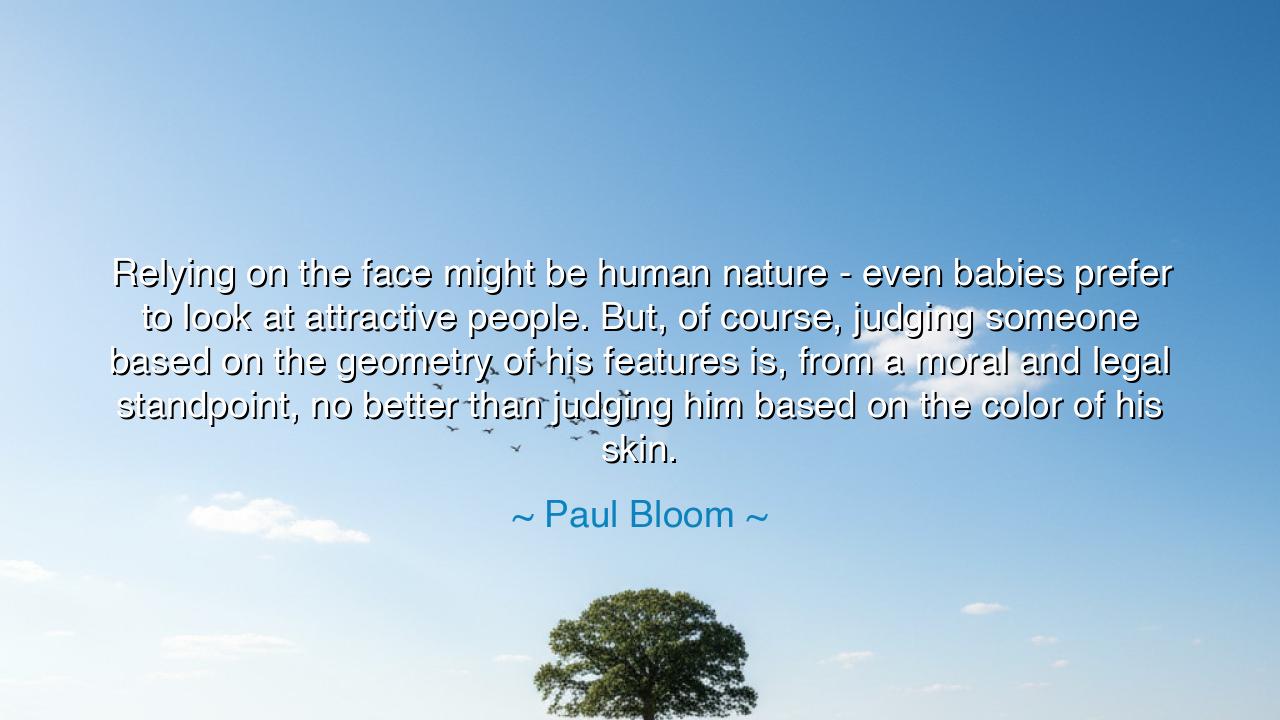
Relying on the face might be human nature - even babies prefer to
Relying on the face might be human nature - even babies prefer to look at attractive people. But, of course, judging someone based on the geometry of his features is, from a moral and legal standpoint, no better than judging him based on the color of his skin.






Hear the words of Paul Bloom, a scholar of the mind, who uncovered the hidden currents of human judgment and declared: “Relying on the face might be human nature—even babies prefer to look at attractive people. But, of course, judging someone based on the geometry of his features is, from a moral and legal standpoint, no better than judging him based on the color of his skin.” In this teaching, he warns us that instincts, though natural, are not always righteous, and that the true path of wisdom lies in rising above the temptations of the eye.
The origin of this saying rests in the fields of psychology and philosophy, where Bloom has long studied how humans think, feel, and judge. He observes that from the earliest days, even infants gaze longer at those they find “attractive,” proving that the pull of beauty is ancient and biological. Yet what is natural is not always what is just. Bloom’s warning reminds us that to equate worth with the symmetry of a face is as shallow and as cruel as to equate it with the color of skin. Both are accidents of birth, and neither reveals the truth of a soul.
History shows us the danger of such judgments. In the courts of medieval Europe, men believed that a criminal could be spotted by the shape of his skull or the sharpness of his nose. This false science of “physiognomy” condemned countless innocents, branding them as wicked simply for their appearance. Centuries later, the same error lived on in the pseudoscience of eugenics, where entire peoples were judged inferior because of features they could not change. These dark chapters reveal what Bloom insists: that to judge by features is to abandon both morality and truth.
Yet the allure of the face has not vanished. Even today, studies show that people with conventionally attractive appearances are more likely to be hired, promoted, and trusted, while others are overlooked or scorned. The courtroom itself has not been free of this bias; jurors and judges, though sworn to fairness, have sometimes shown mercy to the handsome and harshness to the plain. In these moments we see how nature’s instinct can corrupt justice, unless corrected by deliberate choice.
The lesson Bloom offers is one of vigilance. He does not deny that humans are drawn to beauty; he admits it begins with babies themselves. But he calls us higher, reminding us that our true worth as moral beings is measured not by surrendering to instinct, but by rising above it. To see past the face, to listen beyond the features, to weigh a person by character rather than accident—this is the calling of those who seek wisdom.
Consider the example of Abraham Lincoln, whose rugged, uneven appearance caused some to call him ungainly or even ugly. Yet his spirit of justice, humility, and courage led a nation through its darkest trial. If men had judged him by geometry alone, they might have dismissed him; instead, history remembers him as one of humanity’s greatest leaders. This is the truth Bloom seeks to remind us of: greatness lies not in the face, but in the heart.
And what shall we do, we who live among faces every day? First, we must check our own hearts, asking whether we too are guilty of favoring the outwardly pleasing over the inwardly good. We must be slow to judge by appearance, quick to listen, and eager to know the person beneath the skin. Second, we must strive to create systems—schools, workplaces, courts—that do not allow surface judgments to decide destinies. By doing so, we build a society where character outweighs appearance, and where justice is truly blind.
So remember the teaching of Paul Bloom: though the eye may be tempted by symmetry and beauty, the soul must be guided by justice and compassion. To judge by the face is as wrongful as to judge by the skin. Rise above instinct, seek the truth of the heart, and treat every person as a being of equal dignity. For in this lies the path not only of morality, but of a humanity worthy of its name.






AAdministratorAdministrator
Welcome, honored guests. Please leave a comment, we will respond soon